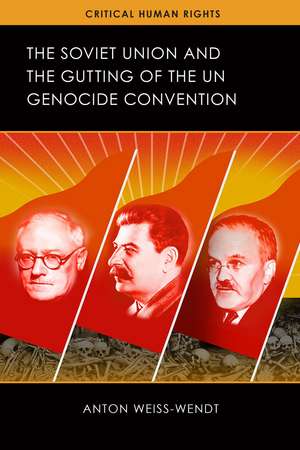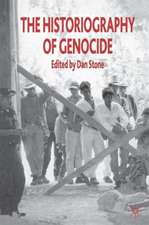The Soviet Union and the Gutting of the UN Genocide Convention: Critical Human Rights
Autor Anton Weiss-Wendten Limba Engleză Hardback – 24 iul 2017
After the staggering horrors of World War II and the Holocaust, the United Nations resolved to prevent and punish the crime of genocide throughout the world. The resulting UN Genocide Convention treaty, however, was drafted, contested, and weakened in the midst of Cold War tensions and ideological struggles between the Soviet Union and the West.
Based on extensive archival research, Anton Weiss-Wendt reveals in detail how the political aims of the superpowers rendered the convention a weak instrument for addressing abuses against human rights. The Kremlin viewed the genocide treaty as a political document and feared repercussions. What the Soviets wanted most was to keep the subjugation of Eastern Europe and the vast system of forced labor camps out of the genocide discourse. The American Bar Association and Senate Committee on Foreign Relations, in turn, worried that the Convention contained vague formulations that could be used against the United States, especially in relation to the plight of African Americans. Sidelined in the heated discussions, Weiss-Wendt shows, were humanitarian concerns for preventing future genocides.
Based on extensive archival research, Anton Weiss-Wendt reveals in detail how the political aims of the superpowers rendered the convention a weak instrument for addressing abuses against human rights. The Kremlin viewed the genocide treaty as a political document and feared repercussions. What the Soviets wanted most was to keep the subjugation of Eastern Europe and the vast system of forced labor camps out of the genocide discourse. The American Bar Association and Senate Committee on Foreign Relations, in turn, worried that the Convention contained vague formulations that could be used against the United States, especially in relation to the plight of African Americans. Sidelined in the heated discussions, Weiss-Wendt shows, were humanitarian concerns for preventing future genocides.
Din seria Critical Human Rights
-
 Preț: 167.81 lei
Preț: 167.81 lei -
 Preț: 171.14 lei
Preț: 171.14 lei -
 Preț: 257.44 lei
Preț: 257.44 lei -
 Preț: 234.39 lei
Preț: 234.39 lei -
 Preț: 159.02 lei
Preț: 159.02 lei -
 Preț: 201.83 lei
Preț: 201.83 lei -
 Preț: 233.54 lei
Preț: 233.54 lei -
 Preț: 189.99 lei
Preț: 189.99 lei -
 Preț: 311.92 lei
Preț: 311.92 lei -
 Preț: 254.11 lei
Preț: 254.11 lei -
 Preț: 225.80 lei
Preț: 225.80 lei -
 Preț: 258.01 lei
Preț: 258.01 lei - 23%
 Preț: 473.27 lei
Preț: 473.27 lei -
 Preț: 179.28 lei
Preț: 179.28 lei -
 Preț: 176.61 lei
Preț: 176.61 lei -
 Preț: 177.37 lei
Preț: 177.37 lei -
 Preț: 235.78 lei
Preț: 235.78 lei -
 Preț: 221.81 lei
Preț: 221.81 lei -
 Preț: 213.29 lei
Preț: 213.29 lei -
 Preț: 237.55 lei
Preț: 237.55 lei -
 Preț: 231.15 lei
Preț: 231.15 lei - 23%
 Preț: 472.22 lei
Preț: 472.22 lei -
 Preț: 180.25 lei
Preț: 180.25 lei -
 Preț: 510.83 lei
Preț: 510.83 lei - 23%
 Preț: 474.60 lei
Preț: 474.60 lei - 23%
 Preț: 473.72 lei
Preț: 473.72 lei - 23%
 Preț: 590.00 lei
Preț: 590.00 lei - 23%
 Preț: 477.70 lei
Preț: 477.70 lei - 23%
 Preț: 472.37 lei
Preț: 472.37 lei - 11%
 Preț: 230.06 lei
Preț: 230.06 lei - 13%
 Preț: 200.36 lei
Preț: 200.36 lei - 19%
 Preț: 437.91 lei
Preț: 437.91 lei
Preț: 452.84 lei
Preț vechi: 588.12 lei
-23% Nou
Puncte Express: 679
Preț estimativ în valută:
86.66€ • 94.10$ • 72.80£
86.66€ • 94.10$ • 72.80£
Carte tipărită la comandă
Livrare economică 22 aprilie-06 mai
Preluare comenzi: 021 569.72.76
Specificații
ISBN-13: 9780299312909
ISBN-10: 0299312909
Pagini: 400
Dimensiuni: 152 x 229 x 28 mm
Greutate: 0.7 kg
Editura: University of Wisconsin Press
Colecția University of Wisconsin Press
Seria Critical Human Rights
ISBN-10: 0299312909
Pagini: 400
Dimensiuni: 152 x 229 x 28 mm
Greutate: 0.7 kg
Editura: University of Wisconsin Press
Colecția University of Wisconsin Press
Seria Critical Human Rights
Recenzii
"An absorbing and important contribution to the history of the Cold War, as well as to international law and its political uses." —Peter H. Solomon Jr., author of Soviet Criminal Justice under Stalin
"A fascinating study of the political manipulation, by both superpowers, of the Genocide Convention as it was being drafted at the dawn of the Cold War and in the period following its adoption." —William Schabas, author of Genocide in International Law: The Crime of Crimes
Notă biografică
Anton Weiss-Wendt directs research at the Center for the Study of the Holocaust and Religious Minorities in Oslo, Norway. He is the author of Murder Without Hatred: Estonians and the Holocaust and Small-Town Russia: Childhood Memories of the Final Soviet Decade; editor of The Nazi Genocide of the Roma; and coeditor of Racial Science in Hitler's New Europe, 1938–1945.
Cuprins
List of Abbreviations Acknowledgments Introduction 1 The Class Struggle for the Substance and Meaning of International Law 2 Defensive Self-Righteousness in Soviet Diplomatic Practice 3 Net to Codification of International Law 4 The UN Secretariat Draft Genocide Convention 5 Key Soviet Documents on Genocide Analyzed 6 Negotiating the Provisions of the Draft Genocide Convention 7 A Pyrrhic Victory on the Genocide Convention 8 Drafting the Universal Declaration of Human Rights 9 The Forced Transfer of Children Clause, or the Balkan Gambit 10 The Morning After: US Ratification Put on Hold 11 Raphael Lemkin and the Émigré Anticommunist Front 12 Communism=Stalinism=Nazism=Genocide 13 Subversion Alleged: Draft Covenant on Human Rights and Draft Code of Offenses Against the Peace and Security of Mankind 14 The UN Investigation of Forced Labor, 1948?1954 15 The Making of Genocide in the Korean War 16 Racial Discrimination in the United States: We Charge Genocide 17 Race Relations in America and the Soviet Peace Offensive 18 Thou Shalt Not Indict: The Status Quo on Genocide in the 1950s Conclusion Notes Bibliography Index
Descriere
How both the Soviet Union and the United States manipulated and weakened the drafting of the United Nations Genocide Convention treaty in the midst of the Cold War.

